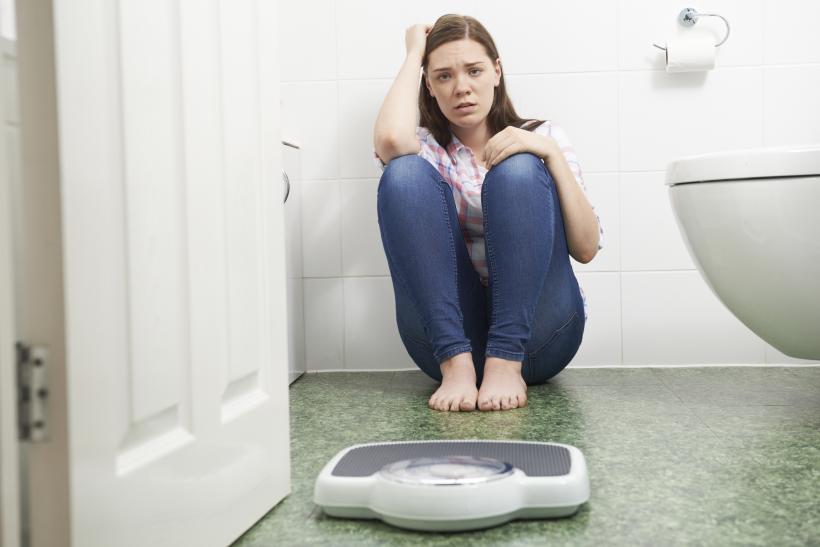
The main argument against having more open conversations about anorexia is that one person’s recovery memoir is another girl’s manual.
When I was 17, starting my senior year of college, I dropped 30 pounds in two months. My mother noticed, and as the weight dropped off, grew concerned. She took me in for a doctor’s appointment.
“You haven’t had a physical in a while,” she said, an excuse I half-believed.
The doctor, a kind and professional woman, sat my mother and me down at the desk in her office before she examined me. My mother voiced her concerns about my weight. They looked to me for an explanation.
“I guess I just haven’t really been paying attention,” I said.
The doctor advised me to start keeping an eye on what I ate, to make sure I was getting enough food. I nodded, trying to appear as earnest as possible. And I think I did feel earnest about my reassurance that I would, indeed, start paying attention: I knew exactly how much I was — rather, wasn’t — eating, but it took me years to admit to myself that what I was doing really was a problem.
The danger of someone finding information about an eating disorder and using it the “wrong way” is real, but it’s a risk no matter what we do or how much we talk about it. And, in fact, the more we shroud anorexia in danger and mystery, the more appealing it may be.
After the checkup, the doctor sent me home without another word. I knew my mother wasn’t altogether reassured, but what could she do? The doctor had said I was fine.
I don’t think I heard the word anorexia in any context that so much as vaguely related to me until college. It was on an anonymous confessional forum, repeatedly set up and shut down and set up again by other students. On this board, you could post something anonymously, and people could respond to it in the comments — anything at all: questions, crushes, event publicization. Mostly, though — of course — people talked shit about other students. There was no getting rid of it: every time someone hacked it to make it go away, it sprung up again, better and more resilient each time.
A trope on the confessional was for someone to post a student’s name, followed by a question mark, and people would sound off on what they thought of this person in the comments. Someone posted, “Molly Bradley?” The comments were mostly innocuous, a few kind.
One said: “definitely anorexic.”
This comment was, frankly, as innocuous as they come. Yet, someone below this commenter wrote: “molly bradley is the nicest! don’t say a goddamn thing about her!” It made me at once want to find out the identity of my unknown defender, but at the same time, their comment didn’t quite align with the criticism. For someone to call me out as “definitely anorexic” was, for one, true (though I still hadn’t admitted at the time), and for another, not a slight. I was as touched as I was perturbed by the defensive reaction it elicited, and I was far more perturbed by the response than I was by the original post.
There are two prevailing conceptions of anorexics and their stories: one, that they’re tainted. Two: they’re dangerous.
The first one is the more innocuous conception, but it’s still not productive: people are reluctant to apply, clinically speaking, the label “anorexic” on a person (particularly a woman) because to be anorexic is, by and large, a Bad Thing. If you’re anorexic, you’re damaged, in some way — even despite whatever twisted sexiness also comes with the label. You officially qualify for a mental illness — and we know how, socially, people with mental illnesses tend to be treated, despite the rise of better advocacy and efforts to normalize it. On top of the sheer social stigma, if someone is clinically diagnosed as anorexic, you’ve got to deal with it. Very few people who suffer from anorexia can make a healthy recovery without some help, be it from their families, a therapist, or an entire team of professionals.
The second conception is one that people talk around, but not directly about: that people with anorexia are dangerous. No one quite says that outright, but the evidence is everywhere: in our reluctance to talk about it in public. In our unwillingness to have preemptive conversations about it with young men and women. In the angry onslaught of demands to pull any anorexia-centered film or narrative from the shelves — lest any of these things give people the idea that anorexia may, in fact, be something they might like to take up.
Several times over the past four years, I have written things about both my experience with an eating disorder and eating disorders in general, and I have submitted them to websites and journals online where it seemed like my writing would be a good fit. Almost all of these times, I received a response that told me that the publication “steered clear” of any and all writing about eating disorders — something not explicitly stated in their submission guidelines.
You Might Also Like: 5 Things Eating Disorder Victims Are Sick of Hearing
I went on a date one time that was successful enough to turn from drinks and bar snacks into a five-hour conversation, at the bar and on a long walk around the neighborhood. We’d just met, but the conversation veered early on into some fairly personal stuff. I’m not sure who brought the subject up first, but I shared with her that I had only relatively recently started recovering from a years-long eating disorder.
“Oh, yeah,” she said, “we all go through our anorexic phase.”
I felt shocked by her response, though I tried not to show it. On the one hand, I think I know what she meant: that every young girl struggles, more severely than anyone probably realizes, with body image and figuring out how best to eat to both feel good and like how they look. But I felt a little numbed by the implication that “we all” actually go through anorexia — an assertion that either diminishes my experience when I choose to share it or worse — if true — means that there is a pandemic much more severe than we realized that we’re not addressing.
Regardless, we should address it. By not talking about it, we leave the people — and by “people,” I mean everyone from young women to adult men, many of whom suffer from youth through adulthood — to grapple with their compulsive, critical thoughts alone. We leave them to enact their destructive habits in plain sight and to figure out solutions, if they want or need them, by themselves. There’s a ton of literature on anorexia and other eating disorders out there — on the internet, in print, and through support groups — but if you don’t know it’s there, or if you don’t know where to find the safe and reliable information, it’s far from intuitive.
The main argument against having more open conversations about anorexia is that one person’s recovery memoir is another girl’s manual.
It’s a highly valid concern. And, of course, I am not trying to argue that there isn’t already a lot of material about eating disorders available out there. But whenever it is made available anywhere other than through a doctor, a therapist, or a clinic, people get uncomfortable.
The danger of someone finding information about an eating disorder and using it the “wrong way” is real, but it’s a risk no matter what we do or how much we talk about it. And, in fact, the more we shroud anorexia in danger and mystery, the more appealing it may be. When logging onto controversial pro-ana forums doesn’t just enable your eating disorder but serves as a subversive, taboo act, it becomes more vital to your identity in ways that don’t exclusively belong to your eating disorder.
If clear, factual information was more readily available about the damage that eating disorders do, people suffering from them might be more inclined to seek help sooner, or at least would be made aware that their habits are not sustainable the way they might think they are. If more objective information were presented in the clear light of day to counteract the often romantic portrayals of eating disorders in the dark corners of the internet, people might associate less envy and wistfulness with the images they see.
One of the main reasons people don’t want to talk about anorexia is that the same narrative keeps repeating: thin, relatively privileged white woman wants to become thin, all but stops eating, shrivels to a delicate skeleton, nearly dies. Sometimes recovers, sometimes doesn’t.
There are some ways we could make this information available.
School health programs could go into more detail about what eating disorders do, rather than just providing cursory explanations of what they are, and school nurses could be trained to speak in detail with young women about it. Parents could have conversations about food, health, and wellness with their kids with the same sobriety and preemptive-ness with which they have the sex talk. Biology courses from middle school through college, in their nutrition components, could design an interactive way to demonstrate the fact that the human body, even at total rest, needs a substantial amount of calories to live. People could be taught to trust science.
Outside of the dangers of exposing people to the idea of anorexia and its “practice” (who may have maintained a healthful distance from it before), one of the main reasons people don’t want to talk about anorexia is that the same narrative keeps repeating: thin, relatively privileged white woman wants to become thin, all but stops eating, shrivels to a delicate skeleton, nearly dies. Sometimes recovers, sometimes doesn’t.
There are a plethora of bad tropes in this narrative that we need to expunge, including but not limited to: the notion that you must be dangerously, skeletally thin to have an eating disorder; that only rich, young, white girls “get” anorexia; that it’s exclusively a matter of exposure to the media, and that the main, conscious, driving factor behind these (thin, white, young) women’s anorexia is the desire to look like the waifish models they see in magazines. The idea that anorexia is fully a choice, and that you can turn it off whenever you want, or if some yells “Just eat!” at you forcefully enough.
But maybe the worst trope is the whiteness and privilege of the women whose anorexia we tend to hear about. We hear narratives from women of color far less frequently than those of white women in the first place — and so it follows that anorexia narratives from women, and men, of color are even harder to find. And it makes sense to conclude that with all the white narratives clogging the pipeline, there’s little room for POC’s stories to come to the fore.
If we so readily shut down anorexia narratives in general, both because of their danger and the fact that they’re played out, we make it even harder for POC to step forward with their anorexia stories.
Melissa Fabello wrote an excellent piece for The Establishment along these lines, about the “anorexia movie” To The Bone, contrasting it with the recently released memoir Hunger by Roxane Gay, which is about Gay’s super-morbid obesity. Fabello points to the fact that memoirs like Hunger are not just fewer and further between than anorexia narratives, but come under much more scrutiny than eating disorder narratives do — just as fat bodies come under more, and more damaging, scrutiny than thin bodies.
But perhaps the words that sum it up best come from Gay herself, in Hunger: “My rage is often silenced because no one wants to hear fat-girl stories of taking up too much space and still finding nowhere to fit. People prefer the stories of the too-skinny girls who starve themselves and exercise too much and are gray and gaunt and disappearing in plain sight.”
We absolutely need to evolve the narrative, and try to handle it as healthfully as possible. We can’t keep pushing the “gray and gaunt and disappearing” narrative at the expense of stories like Gay’s. But hiding anorexia narratives from the view of the people it might help — whether people suffering or their friends or families around them, who want to learn about it — is not the solution.
Having the main character in To The Bone be a POC would have been much better. Giving more voice to the POC characters should have been a no-brainer. Having the protagonist — whoever they’re played by — lose a dangerous amount of weight specifically for the role should absolutely not have even been considered, with or without a doctor’s supervision. As Gina Susanna points out on her blog, Nourish and Eat, the anorexia narrative in To The Bone could have been deepened and expanded by casting a protagonist of a “normal,” unremarkable weight, demonstrating the reality that anorexia does not only have one face.
It’s not an easy shift to make, to shed light on a taboo, to talk about something that people really don’t like talking about — that people would rather read and deliver as sensationalism, gawk at, and then stuff away somewhere.
But all we can do is start somewhere, and here are some tangible ideas for where to start:
We should talk about anorexia and eating disorder narratives in a broader conversation about the body.
People have done an excellent job bridging eating disorder recoverers and the body positive movement, but having a conversation that encompasses both thin and fat bodies is the next step. This includes talking about those subjects together, and people with every body type talking with each other, listening to each other’s stories instead of penning an article about which type is being shamed now and deserves the most sympathy (the subtext always being that said body type is being shamed by the other). These conversations don’t have to, and shouldn’t, exist in an objective hierarchy.
We should talk about works of art and writing related to different types of bodies together.
For example, consider To The Bone and Hunger together, as Fabello does.
We need to acknowledge that there will never be a surefire way of keeping conversations about the body from being used as guidelines for women struggling with their bodies and/or who may be predisposed to anorexia.
It’s not dissimilar to the concept of trigger warnings: shield people from direct discussion of uncomfortable topics all you want, but very often, the things that will viscerally, emotionally trigger them occur unexpectedly, unpredictably. I could cite, here, two articles that I read immediately before I threw myself wholeheartedly into relapse, but what good would that do? I don’t blame those articles for my relapse, and neither should anyone else. They were in the right place at the right time — or, that’s how I thought of it then. In my mind now, half a year into recovery, I recognize them as having been in the wrong place at the wrong time.
Ultimately, the most helpful preventative action we can take against eating disorders is to try and shape a world where, despite chemical inclinations, we don’t fetishize and reward embodiments of female restraint, such as thinness, food choices, and restrictive clothing. To not talk explicitly about the rewards we give for thinness — and we really do heap them on — is tantamount to a kind of gaslighting on an outrageously large scale.
The question of how to stop rewarding thinness is another conversation altogether, and an equally important one. But in the absence of being able to flip a switch and turn it off, what we absolutely can do is provide full and unflinching information about why we shouldn’t cater to those rewards. The more we have healthy, above-the-table conversations about eating disorders, and show precisely how destructive they are — not via gently-lit images of bony body parts and pretty, listless girls, but in discussions with survivors about how many relationships and opportunities they lost as a result of their illness — the more likely we make it that people will at least be fully informed, and hopefully make it more likely that they won’t opt-in.








